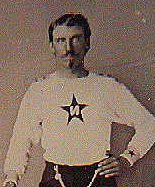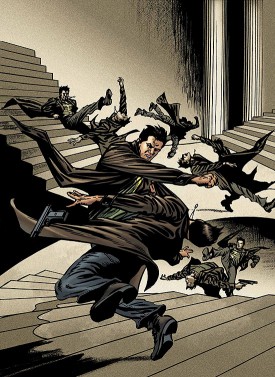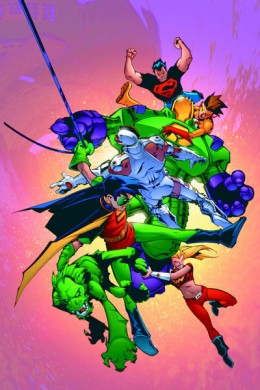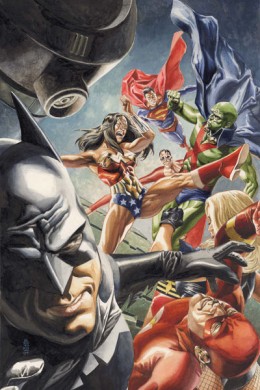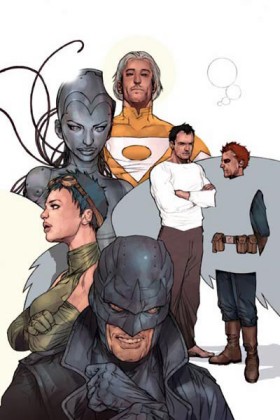|
|
|
|
Jason
Schachat was once known as Ultimate Moonboy, but
for different reasons.
|
Jason
Schachat's Weekly Breakdowns
January 24, 2005 Is
anyone else upset that they haven’t made Ultimate
Devil Dinosaur yet?
No?
Just me?
Dammit, people,
that’s a goldmine just waiting to be… mined…
and stuff…
Anyways…
Ed Brubaker’s
probably best known for the realism and exciting storytelling
he’s brought to the Batman franchise, but, when no
one was looking, he became one of the best authors to grace
the Wildstorm Universe (a group that includes Warren Ellis,
Garth Ennis, Grant Morrison, Kurt Busiek, and Alan Moore).
Yet, while most authors have tried to push Wildstorm’s
struggling properties in new directions, Brubaker used The
Authority: Revolution to show us how to take the evermore
ill-defined team in all their mad glory and tell a good
tale.
The
Authority: Revolution #4 brings Swift back
into the action after she was nearly killed a few months
ago. The Engineer catches her up on the current situation
(patriotic superheroes from the past have returned to the
scene with significant boosts to their abilities and are
starting a new American “revolution”) just before
we see Paul Revere and his Sons of Liberty gathering a hypnotized
army of thousands on the White House lawn.
The Doctor gets
a nice moment to reflect on how his attempt to use religion
to spread his shamanistic message made targets of his followers--
then we’re plunged into the action. Both teams go
into the fight at full force, but The Authority soon gain
the upper hand. It looks like the day is saved… until
five year old Jenny Quantum gets a message from her future
self that she has to stop it all. If only she’d gotten
that message soon enough to prevent the disaster that comes.
Brubaker’s
pacing and threading here are fast and intricate, making
The Authority: Revolution a great read with those
breathtaking surprises so many Authority stories are missing.
I think what I find most interesting, however, is that he
didn’t have to go back to Warren Ellis’ model
to do so. He’s kept in all the history and characterization
of the last few years, leaving us with a very vocally gay
Midnighter and Apollo, a brash Swift, and a Doctor constantly
struggling NOT to score a fix.
But it works.
Despite all the broken and clunky elements that have pushed
the franchise away from Ellis’ ultimate archetypical
vision, Brubaker’s able to make us feel like we’re
back home without turning the car around. Dustin Nguyen’s
pencils may remind us of the sad filler arcs that portended
the death of the first series, but he keeps the panels flowing,
despite some bizzarely stylized characters. The Authority
still may not have returned to their former glory (more
on that later), but this maxiseries is looking to be their
best 12-issue run since the beginning. Definitely recommended.
|
|
|
Why
do you keep hitting yourself, huh?
Why do you keep hitting yourself?
|
Sadly,
Madrox #5 marks the end of the
one X-mini in the last year that’s been more than
merely passable and, surprisingly, far from downright awful.
The story keeps up the pace and gives us a pretty rapid
fire ending that solves our big mystery but in no way ends
the story of Jamie Madrox and his mutant buddies.
Jamie finds himself
still trapped in the burning printshop with Clay (pretty-boy
mob henchman at large) holding a gun to his head, but he
happens upon the clever idea of proposing to his would-be
executioner it’s the part of the story where the villain
reveals his mad plan. Clay agrees and reveals that femme
fatale Sheila was the real villain all along, leaving Jamie
nearly choking on his own incompetence.
But what would
this be without a sudden rescue by one of Madrox’s
wayward duplicates? Yessir, two against one are mighty fine
odds—until you find out Clay can also create multiples
of himself. And he also seems to know more about being a
Multiple Man than Jamie does…
Writers
go through all sorts of phases, and, if this is Peter David’s
Noir phase, I’m on for the long haul. The recently
cancelled Fallen Angel demonstrated he knew how
to play with the genre, but Madrox has shown he can take
even the least loved remnants of X-Factor and make them
new by passing them through the Noir filter. Loving homages
to and parodies of Noir standards combined with the clever
examination of what one can do, being a regular joe who
can create and absorb copies of himself, made this series
well worth the money.
Much
as I appreciate editor Andy Schmidt sticking to his guns
and not extending the mini into a full blown series, I also
hope it’s only so they can apply the appropriate tweaks
to make this a strong ongoing series. From the implications
in his letter to the readers, it looks like we’ll
be getting some more multiple lovin’ in the near future.
(Rumored to be known as X-Factor Investigations. - ed.)
Spider-Man
India #3 continues to remind us why it’s
a bad idea to ship this re-imagining to America: we’ve
seen it before. Even if you haven’t read the comics,
watched the cartoons, bought the trading cards, or seen
re-runs of the old TV series, most people who would pick
up this book have seen the movies and, mystical origin aside,
the conflict is just too similar.
First we get
a fight between Spidey and the newly demonized Doctor Octopus
that lasts for about half the issue and accomplishes nothing.
Doc Ock then runs off to his master Rakshasa (think Green
Goblin), licking his wounds, while Pavitr Prabahakr (think
Hindi for Peter Parker) gets chewed out by Aunt Maya. So,
essentially nothing happens. This issue is all about the
fight, and the fight sucks.
Jeevan
J. Kang and his scribes hit some interesting notes with
the unwilling Doc Ock and a new Spidey that can actually
banter, but the art is still unbalanced, cluttered, and
lacking in flow. Again, it could be something an Indian
audience would go for, but, when you give Americans a Doc
Ock/Spidey power battle, you damn well better hit it out
of the park. Spider-Man India’s still playing T-ball.
|
|
|
Now
we know what was in the box...
|
But,
if you’ve been waiting for a good point to jump onto
Teen Titans, issue #20
is it. Readers familiar with recent events may have a better
footing, but all the references and little factoids you’d
want to know come from the pages of Outsiders, Green
Arrow, Identity Crisis and Superman/Batman
rather than previous issues. The amazing thing: it still
makes sense!
This single-issue
story gives us some much needed catharsis as Robin shows
us around Titans Tower, trying to escape from the recent
death of his father. He slinks around and ponders how he’s
slipping into the cold solitude Batman himself has embraced,
cursing himself for stepping away from the light. Starfire
leaves the team to aid Nightwing and the Outsiders while
Raven attempts to craft a secret identity and become a regular
kid during her off-hours. But Superboy has heard of Tim’s
loss and knows it’s eating at him.
Too bad they
have more immediate concern. Namely, Lex Luthor’s
Kryptonite-powered battle suit and the supervillains fighting
over it.
I don’t
know why it had to be Geoff Johns rather than Bill Willingham
or any of the other Bat-writers that got to pen Robin’s
big release, but man-oh-man did he get it right. Teen
Titans has done well in his hands, but this issue is
a must for all DC fanboys. Epilogues aside, it’s standalone
and does a fantastic job of drawing the reader into the
Titans’ world. On the other hand, it also pulls from
the events of Identity Crisis in a way that BEGS
fans of last year’s uber-miniseries to hop onboard.
If there’s
one disappointment I have with this issue, it’s that
Mike McKone didn’t pencil it. Exclusive contracts
be damned, he was a vital part of the creative team and
new penciller Tom Grummett will be quite busy filling his
shoes. That said, Grummett does a damn fine job of it this
month and I’m looking forward to seeing more from
him. (except Marvel snatchd him away, too...) Strongly
recommended.
Say
what I might about Mark Millar’s writing ability,
the man has a great grasp of what it means to be thoroughly
immoral, and that’s why Wanted #6
works. Following last issue’s all-out battle, Wesley
finally gets the Big Exposition from his dad (a supervillain
whose “death” kicked off this entire series).
He explains to
sonny-boy that it all goes back to the big Crisis that gave
supervillains control of the world. How he broke up with
Wesley’s mother and they went their separate ways,
but he was always looking out for his boy. How all existence
changed when the villains took over, and how, after all
he’d done, pops knew he’d failed to give his
son his birthright.
What
I find most compelling about this issue is the way it relates
the story to our own world, bringing the plot full circle.
The Killer tells us that the universe of Wanted
used to be the near-perfection of the DC Universe—until
the bad guys’ reality-altering machine turned it into
our own filthy existence. Millar also gives us nice details
like the Supervillain ‘70s nightclub and the key party
that led to Wesley’s conception.
Jones’
pencils are an exciting interpretation of photo-realism
that put this book into the honored halls of widescreen
comics, but his character designs are just a bit distracting.
Casting Eminem and Halle Berry as your comic’s reference
material is one thing, but looking EXACTLY like them has
a tendency to pull you out of the story. The Ultimate Universe’s
Nick Fury may be modeled on Samuel L. Jackson, but he looks
dissimilar enough for us not to go “Damn, that’s
Samuel L. Jackson!” every two minutes.
All
in all, I’d say Wanted got it right. Will
it change your world? Probably not as much as the ending
suggests it should (and it’s a good thing Millar went
through Image for this one; it’d easily get censored
in these paranoid times), but this will surely go down as
one of the best supervillain minis ever done. Recommended.
|
|
|
Come
on, Batman, you can take her!
|
Contrary
to what Derek wrote in last week’s Spotlight, I found
Wonder Woman #212’s guest
art to be quite good. James Raiz (best known for the Warren
Ellis kaiju mini Tokyo Storm Warning) puts in a fine showing
that, unfortunately, brings to light some of the flaws in
the rest of the creative team.
Diana, still
blind from her battle with Medusa, refuses to resign from
the Justice League and is put to a test by Batman and the
rest of the gang. She pretty much passes with flying colors,
but they’re unsure of whether she should be putting
herself in such danger after all she’s been through.
Meanwhile, on Mount Olympus, Athena and her fellow goddesses
launch their coup against Zeus, asking that he listen to
reason and step down. It might’ve worked, too, if
the old man didn’t choose a titan to champion him
in a battle no immortal can enter.
So, yeah, Diana’s
getting drafted.
I still
like what Rucka’s doing with many of the mythological
aspects of this book, but we’re starting to see some
repetition. Veronica Cale’s schemes have been failing
so much, it’s getting hard to see her as a real threat.
Wonder Woman’s JLA test seems just too close to Speedy’s
recent Teen Titans initiation in Green Arrow. Diana
being used as a pawn in the games of the gods AGAIN... well,
didn’t we just do this?
I suppose you
could call it a continuation or a build, but it’s
starting to feel like we’re swimming in circles. And,
while James Raiz’s art rises above certain bad habits
(odd notions of perspective, overuse of architectural backgrounds/gridlines,
some strange character designs) it nearly falls apart under
Ray Snyder’s heavy inks.
Don’t get
me wrong: I loved the way Snyder inked Drew Johnson’s
work on the series, but Raiz’s extremely busy style
becomes cluttered and claustrophobic with all those heavy
lines. The good news is this mismatch is only scheduled
for another month, but the bad news is you may go cross-eyed
from all the unnecessary detail. This issue manages to come
together, but I wouldn’t recommend it to anyone not
following the series.
Requested
Review of the Week
Deciding
to post a whole new forum topic just to get my attention,
Goodson rather loudly requested my own ridiculously vocal
opinion of The Authority for The Authority:
Human on the Inside, a hardcover graphic novel
that hit the shelves a few months back. This time around,
writing duties are handed off to novelist and part-time
screenwriter John Ridley, while the art comes from talented
2000AD alum Ben Oliver.
Our story opens
with the once original but now trite destruction of all
existence followed by the destruction of all existence the
day before that and so on and so forth (I still blame Marv
Wolfman). In the present, things are still relatively peachy,
except for the U.S. government trying to start trouble and
getting a slap on the wrist from The Authority.
Naturally, the
President isn’t too happy about getting bullied by
a bunch of yahoos in tights, so he has a friend of some
friends in high places start a series of events that will
lead to The Authority’s downfall. What’s surprising
about this is that it comes in the form of a supernatural
trio that start tearing up Milwaukee. They also tear through
The Authority with relative ease, but some random hero who
combines the overboard martial arts skills of Bruce Lee
with the last name of Jackie Chan shows up and saves them
all.
However, the
seeds of doubt have been planted in the members of the team,
and we see hope begin to fade around the globe as people
start to give in to depression. Why? Because they start
to realize that the future no longer exists (remember that
whole “destruction of all existence” thingy?).
With Jack Hawksmoor and The Doctor out of commission, Apollo
and Midnighter bickering like the old married couple they
are, and Swift presumed dead (yet again), it looks like
The Authority will need to call in some help if they’re
going to save the world, this time.
So, how to rate
this one… Does it fit the Warren Ellis/Bryan Hitch
standard that revolutionized the way we look at superheroes?
No. Can it live up to the Mark Millar/Frank Quitely run
that veered the franchise into the grotesque shockfest it
is today? Nope, not that good, either. Is it the pathetic
snorefest that the current Robbie Morrison/Dwayne Turner
run is? Eh… maybe not that bad, but close.
One thing I can
say in this book’s defense: it has good moments. There
are points where the creators connect with the characters
and get past the murk of the last few years continuity.
Swift was always a quiet character, but I never imagined
putting a gag in her mouth would provide scenes that allow
us to connect with her more than anything since her days
in Stormwatch.
Apollo and Midnighter
share in that beyond brotherly love that makes them the
most powerful re-creation of the World’s Finest we’ve
seen in decades, but it doesn’t slip into too much
of the “mushy stuff” that put the book on awkward
ground. Jack Hawksmoor is still too much of a jerk, but
I doubt anyone except Warren Ellis himself really has any
idea what to do with him.
And, while it’s
nice to have The Engineer pull aside her aluminum siding
in a touching struggle to maintain her humanity, it gives
away a rather cookie cutter bad guy’s motives and
sets up a very clumsy love triangle. I will give it credit
for actually making us sympathize with the characters, though.
But
there are just too many things going wrong for me to recommend
The Authority: Human on the Inside. Broad threads
weave wildly in and out, abandoning logic and making The
Authority look more like a bunch of rank amateurs than a
group that’s saved and ruled the world for years.
Despite some nice messages that aim to bring the team back
to the more heroic grounds they used to stand on, nothing
really changes the status quo, and the villains are completely
lacking in purpose.
I think one of
the problems here is, despite the attempt to return The
Authority to a state of grace, examining their human flaws
goes against the entire concept of the book. This franchise
was once rightly billed as THE superhero book. Ever since
Ellis left, that hasn’t been true. This graphic novel
heavily references the team’s post-Ellis debacles,
once again points out they’re not gods, and ultimately
delivers a story with little subtext and no consequence.
I think it’s
safe to say this franchise needs a complete reboot, either
starting from the beginning again or taking bold strides
forward. No one except Ed Brubaker has been able to make
the current incarnation work, and, let’s face it,
he’s one RARE exception. Everyone else? When taking
over the world and saving the present by rebuilding the
future count as “treading water”, you KNOW you’re
doing something wrong.
Have
a comic you want us to review? Drop
us a line in the forums, and we’ll hunt it down!
Hot
Predictions for This Week: Conan #12, Legion of
Super Heroes #2, Planetary #22, Sleeper Season Two #8, and
Ultimate Fantastic Four #15.
|
